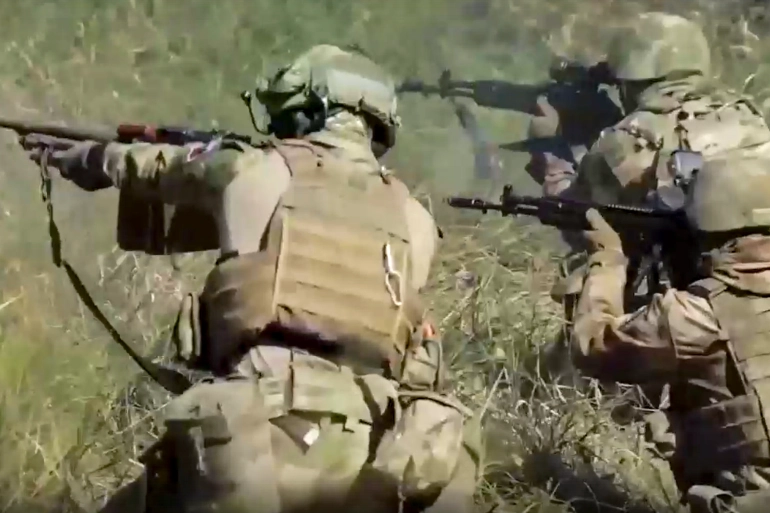
Russian President Vladimir Putin has announced a partial military mobilisation in Russia for the seven-month-old war in Ukraine, warning it is “not a bluff”.
In a televised address to the nation on Wednesday, Putin said he was defending Russian territories and that the West wanted to destroy the country. He said Russia would use all the means at its disposal to protect its territory.

Russian defence minister Sergei Shoigu told state media that Putin’s decree would see 300,000 additional personnel called up to serve in Russia’s military campaign in Ukraine.
Here is how the world reacted to Putin’s announcement:
Ukraine
Ukraine’s presidential adviser says Putin’s announcement of partial mobilisation was an “absolutely predictable appeal”.
“The war is clearly not going according to Russia’s scenario and therefore required Putin to make extremely unpopular decisions to mobilise and severely restrict the rights of people,” Mykhailo Podolyak told the Reuters news agency.
United Kingdom
Putin’s speech was a worrying escalation of the war in Ukraine and his threats must be taken seriously, British foreign office minister Gillian Keegan has said.
“Clearly, it’s something that we should take very seriously because, you know, we’re not in control – I am not sure he’s in control either, really. This is obviously an escalation,” Keegan told Sky News.
United States
The US ambassador in Ukraine says the partial mobilisation is a sign of “weakness”.
“Sham referenda and mobilisation are signs of weakness, of Russian failure,” Bridget Brink wrote in a Twitter message.
“The United States will never recognise Russia’s claim to purportedly annexed Ukrainian territory, and we will continue to stand with Ukraine for as long as it takes,” she said.
Germany
Germany’s Vice Chancellor Robert Habeck said it was “another bad and wrong step from Russia, which of course we will discuss and consult on politically regarding how to respond”.
The government’s spokesperson also said that the “Russian sham referendums in Ukraine will never be recognised”.
The German chancellor sees in Russia’s partial military mobilisation signs that Moscow’s attack on Ukraine is not successful, a government spokesperson said.
Regarding Putin’s plans for four occupied regions to hold referendums in the coming days on joining Russia, the spokesperson said that Russian “sham referendums” would never be recognised.
European Union
The European Union’s executive said Putin’s partial mobilisation decree proved that the Russian president was “in desperation” and only seeking to escalate the crisis.
“This is just another proof that Putin is not interested in peace, that he’s interested in escalating this war of aggression,” a foreign policy spokesman for the European Commission, Peter Stano, told a news conference.
“This is also yet another sign of his desperation with how his aggression is going against Ukraine…he is only interested in further advancing and continuing his destructive war, which has had already so many bad consequences worldwide.”
Stano also said that Putin is waging a “very dangerous nuclear gamble”.
China
China’s foreign ministry urged all parties to engage in dialogue and consultation and find a way to address the security concerns of all parties after Putin warned the West over what he described as “nuclear blackmail”.
China’s position on Ukraine is consistent and clear, Wang Wenbin, Chinese foreign ministry spokesman, said at a regular media briefing on Wednesday.
Netherlands
Dutch Prime Minister Mark Rutte said Russia’s mobilisation order is a sign of panic at the Kremlin, that should not be taken as a direct threat of full-out war with the West.
“The mobilisation, calling for referenda in the Donetsk, it is all a sign of panic. His rhetoric on nuclear weapons is something we have heard many times before, and it leaves us cold,” Rutte told Dutch broadcaster NOS.
“It is all part of the rhetoric we know. I would advise to remain calm.”
Latvia
The EU member which borders Russia said will not offer refuge to any Russians fleeing Moscow’s mobilisation of troops, Latvian Foreign Minister Edgars Rinkevics said in a tweet on Wednesday, citing security concerns.
Czech Republic
Prime Minister Peter Fiala said Putin mobilisation move was an attempt to “further escalate” the war and it was proof that Russia is the “sole aggressor”.
“It is needed to help Ukraine, and in our own interest, we must continue with it,” he added.
Alexey Navalny
Jailed Kremlin critic asserted that partial mobilisation will lead to a “massive tragedy” in a video statement during one of his court cases.
“This will result in a massive tragedy, in a massive amount of deaths… in order to keep his personal power, Putin went into a neighbouring country, killed people there and is now sending a huge quantity of Russian citizens into this war,” Navalny said, appearing in court via video-link.
Moldova
Moldova’s foreign minister “strongly” condemned Russia’s plan to annex occupied Ukrainian regions through pretend referenda.
“We reaffirm support for the sovereignty and territorial integrity of Ukraine within its internationally recognized borders.”
Lithuania
Lithuania raised the readiness level of its army’s rapid response force “to prevent any provocations from the Russian side”, defence minister Arvydas Anusauskas said.
“Since Russia’s military mobilisation will also be carried out in the Kaliningrad region, in our neighborhood, Lithuania cannot just watch,” he wrote on Facebook.
Romania
“Today is international peace day and instead of celebrating it properly, unfortunately, this morning we took note with concern of President Putin’s statement regarding the partial mobilisation of the Russian Federation’s army and the so-called referenda,” Prime Minister Nicolae Ciuca said.
SOURCE: AL JAZEERA AND NEWS AGENCIES








